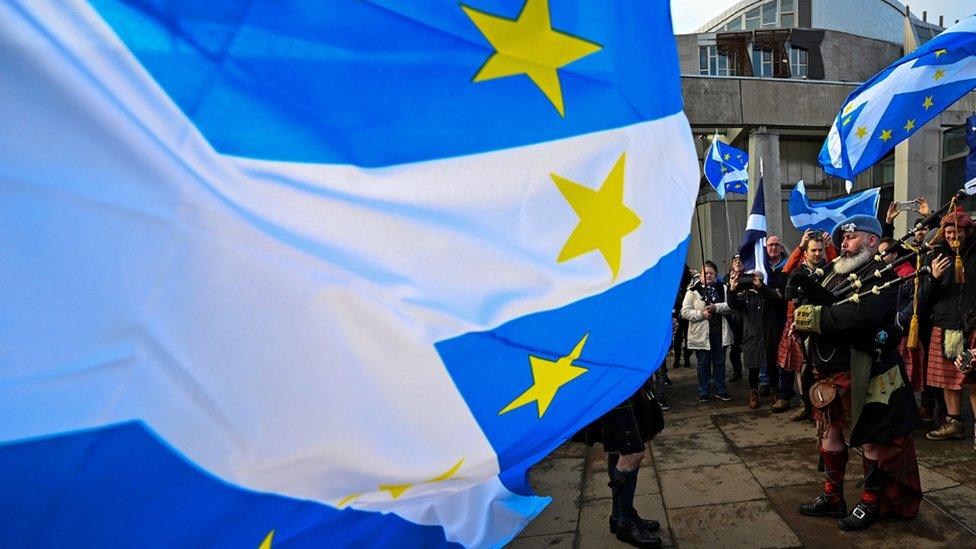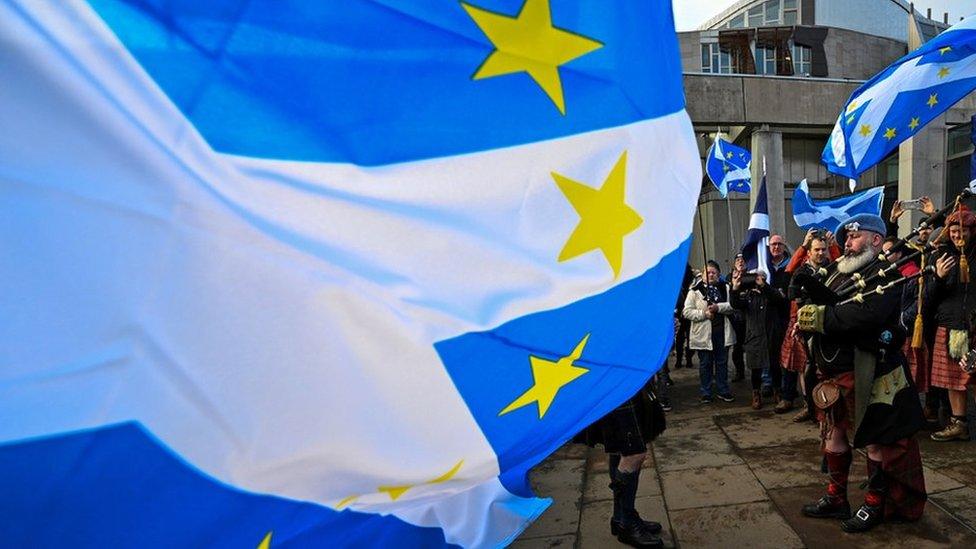Scotland could rejoin EU 'smoothly' - independence paper
- Published

The Scottish government has set out plans for re-joining the EU in an independent Scotland
The Scottish government has published its plans for European Union membership in an independent Scotland.
The document, external is the 7th paper in the Building A New Scotland series.
It says the government would use the Article 49 process to become an EU member "smoothly and quickly".
Ahead of its publication, Constitution Secretary Angus Robertson acknowledged that rejoining the EU would have "challenges" and that it could still involve a lengthy process.
Opponents of independence have said an independent Scotland joining the EU could take many years and would see a hard border with England being created as the rest of the UK would not be members of the single market.
And Prime Minister Rishi Sunak has said the question of Scottish independence was settled in the 2014 referendum and the UK government has repeatedly rejected calls for another referendum.
Accession to the EU is merit-based, but the prospectus paper states that Scotland would be "well-placed to fulfil the requirements" of the process under Article 49 of the Treaty on European Union.
This process would require Scotland to commit to promoting EU values and meeting the Copenhagen criteria.
This criteria states democracy, law and human rights be respected, while prospective countries must also meet the criteria of a "functioning" market economy that can cope with competition and market forces in the EU.
According to the Scottish government's prospectus, rejoining the EU in an independent Scotland would include:
being part of the single market, with "reduced barriers to trade" and less bureaucracy
open access to a larger labour market with no restrictions on employing EU citizens to work in Scotland
the return of the Erasmus+ exchange programme
multi-year funding security for Scotland's farming and rural businesses through the Common Agricultural Policy
EU law enforcement tools, to help police and prosecutors fight cross-border crime and threats "more effectively"
On Friday, Mr Robertson said rejoining the EU would "meaningfully reverse the damage of Brexit".
He said: "Our knowledge, shared values and close alignment with EU law mean Scotland is well placed to fulfil all necessary steps required to become a member state, whilst creating a new and better relationship with our close friends in the rest of the UK."
However, Scottish Conservative constitution spokesman Donald Cameron said the EU plan would mean a hard border with England.
He said: "They would gladly jeopardise jobs and livelihoods with our largest trading partner - the rest of the United Kingdom.
"Yet again, an SNP intervention on EU membership poses more questions than it answers - ministers still cannot explain how any of this would work and what the sacrifices would be. "


There was a time when Nicola Sturgeon thought Brexit - and the idea of Scotland being "dragged out" of the EU - was the lever which would secure a fresh shot at independence.
The referendum she demanded from 2016 onwards never materialised, and the UK is now firmly on the outside of the European club.
But the Scottish government clearly still sees Brexit as a trump card in its arguments for independence.
This paper seeks not just to answer questions about how it would work, but to hold out the prospect of a European future to try to win over voters in Scotland.
The Conservatives - a party long riven by divisions over Europe - seems to have moved on from Brexit, to the extent of bringing its accidental architect, David Cameron, back into government.
But the SNP is determined not to stop "banging on about Europe", as Mr Cameron used to say about his party.
It will be fascinating to see which party has ultimately read the interest levels of the electorate more accurately.

In October, First Minister Humza Yousaf announced his new strategy to gain Scottish independence.
He stepped back from the idea put forward by his predecessor, Nicola Sturgeon, of treating the next general election as a referendum in all but name.
Instead, the party will demand a referendum if it wins a majority of Scottish constituencies at Westminster - 29 seats.
The SNP won 48 seats at the last election in 2019, but recent polling has suggested the party has lost much of its once-huge lead over Labour.
The new strategy was voted through overwhelmingly at the party's annual conference in Aberdeen.
However, it is unlikely that the UK government will agree to another referendum regardless of who wins the next general election.
An amendment passed by delegates stated that if the UK government continued to refuse to accept demands for a second referendum, or to transfer powers to Holyrood to be able to stage one, the SNP should consider using the 2026 Scottish Parliament election as a de facto vote.
Both Labour and the Conservatives have previously made it clear that they would block a second referendum on independence.
- Published3 November 2023

- Published19 October 2023

- Published3 February 2020
